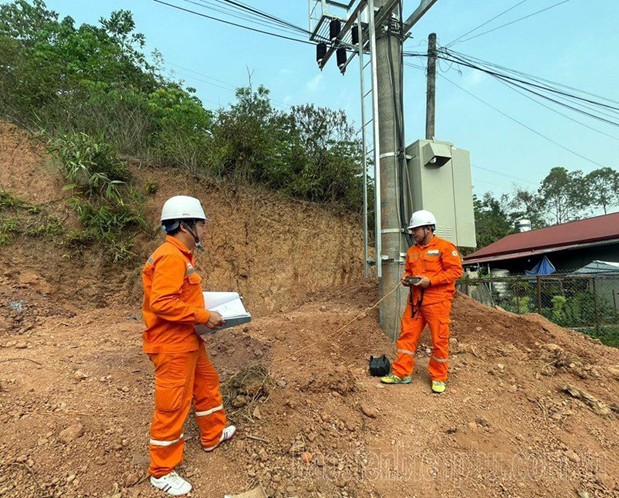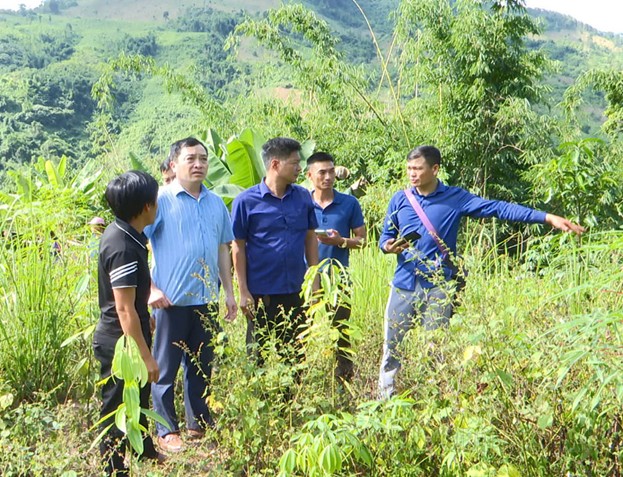Extending the national grid to remote areas in Điện Biên is no small feat. Nậm Đích Village, located in Chà Nưa Commune in Nậm Pồ District, is among the most challenging regions to access. Nearly all its residents belong to the Mông ethnic group, who, until recently, depended on oil lamps for lighting.
By the end of 2023, electricity reached 90 households in the village, marking a significant milestone. Village leader Mùa A Trang shared his excitement: “Life used to be so difficult without electricity; even the simplest tasks were hard to accomplish.”
“Now, everything has changed,” he continued. “Thanks to the Party and the State for investing in the national grid. It has completely transformed life for over 90 households, giving the village a fresh, rural look filled with prosperity and warmth. With electricity, people can now access information through TV and radio, gaining valuable knowledge, particularly about improving crop structures, livestock breeding, and applying modern scientific and technical advances to production.”

Workers from Mường Chà Power Company inspect the electrical system at the Púng Giắt substation in Mường Mươn Commune.
Vàng A Của, a resident of Nậm Đích Village, added: “Since gaining access to the grid, my family’s life has changed. We’ve bought many appliances for daily use, such as rice cookers, electric stoves, and fans.”
“The happiest moment was when we purchased a television. Through its programmes, I’ve learned much about agricultural production and applied it to farming and livestock raising. I’ve also saved up to buy machinery for production, helping to reduce labour, increase productivity, and improve efficiency,” he added.
Nậm Pồ District was established in 2013. At its inception, only 55 out of 121 villages and eight out of 15 communes had access to electricity. Over the past decade, numerous projects have been implemented to bring electricity to remote areas of the district.
To date, 15 out of 15 communes and 101 out of 121 villages in the district have access to the national grid, with an estimated 89.5 per cent of households using electricity. These achievements reflect efforts to extend electricity to highland areas. However, Nậm Pồ District still has 20 villages without access to electricity.
The district’s authorities are mobilising all resources to implement the rural power supply project, aiming to establish an electricity network for residential and production use in 13 villages in eight communes within the district. The project involves the construction of 11 medium-voltage line sections with a total length of over 40.5 km; 11 substations with a total capacity of 550 kVA; more than 25.4 km of low-voltage lines extending from newly built substations and two sections of extended low-voltage lines from existing substations.
Additionally, 582 new electricity meters will be installed.

A working group from Nậm Pồ District conducts outreach to promote land clearance for the power supply project.
Cao Xuân Hùng, Acting Deputy Director of the Nậm Pồ District Project Management and Land Development Fund, stated that the project was approved by the Provincial People's Committee under Decision No 1418/QD-UBND, with a total investment of over VNĐ163 billion (US$6.4 million). It utilises funding from the central and local budgets, with implementation scheduled from 2024 to 2026.
To date, the consulting unit has completed the preparation, appraisal and issuance of bidding documents for the project's packages on the national e-procurement network on November 12, 2024.
Regarding land clearance, the district People's Committee has coordinated with relevant units to promote outreach and advocacy. As a result, 286 out of 316 households, individuals and community groups have voluntarily donated 5,986 square metres of land across 13 sites within the district for project implementation.
The lack of connection to the national grid in Điện Biên Province has significantly hindered socio-economic development, reduced quality of life and limited opportunities for local people. In some areas, residents rely on temporary electricity sources that are unreliable, of poor quality and costly. Delivering electricity to highland areas remains one of the province's top priorities.
Numerous projects have been implemented to extend electricity access to even the most remote households. By the end of September 2024, all 129 communes, wards and towns in the province had access to the national power grid. The proportion of households connected to the grid reached 93.9 per cent, including 92.6 per cent in rural areas.
.jpg)
Thanks to the national power grid, residents of Mường Mươn Commune in Mường Chà District have been able to use modern machinery in both production and daily life.
In 2024, Điện Biên Province approved the investment policy for a rural power supply project under the “Bright Điện Biên” programme. The initiative aims to establish rural power supply systems for residential and production use for 5,093 households in 110 villages from 47 communes in the districts of Điện Biên, Mường Nhé, Mường Chà, Nậm Pồ, Mường Ảng, Tuần Giáo, Tủa Chùa.
These areas include remote, ethnic minority and economically disadvantaged villages. The project entails constructing and installing 365.197 km of 35kV medium-voltage lines; building 105 substations with a total capacity of 5,550 kVA; laying 159.276 km of 0.4kV low-voltage lines; and installing 5,093 electricity metres.
The initiative is divided into seven sub-projects with a total investment of VNĐ1.26 trillion ($49.6 million), to be executed between 2024 and 2026.
This is a significant project that demonstrates the Party and State's attention to ethnic minorities in remote, border villages. It transforms rural appearances, opens opportunities for economic development and sustainable poverty reduction. Moreover, it fosters local advancements in economy, education and healthcare.




.jpg)
.jpg)

.jpg)



.jpg)
.jpg)
.jpg)
.jpg)




.jpg)
.jpg)
You have 500/500 characters left
Please enter 5 or more characters!!!